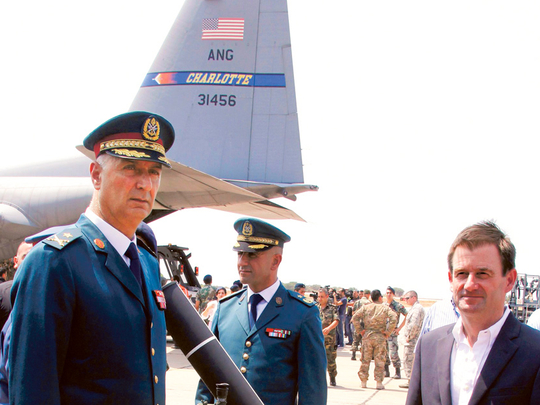
Beirut: A heated exchange between ministers gathered for a cabinet meeting on Thursday drew the ire of Interior Minister Nouhad Al Mashnouq who, according to press reports, warned that “thousands” of militants were deployed on the Lebanese eastern border with Syria and that it may be necessary to close it “if the situation threatens national security”.
Education Minister Elias Bou Saab, who is a member of the Free Patriotic Movement, announced after the cabinet session that “the issue of Arsal has become more dangerous than we already know, and the interior minister told us that the Islamic State [of Iraq and the Levant, Isil] reached the border along with new reinforcements.” Reportedly, a significant force amassed along the border, which was unsettling to say the least.
For his part, a visibly agitated prime minister confirmed that negotiations over the abducted army troops and security forces continued, and while the Muslim Scholars Committee suspended its mediation, Tammam Salam hammered that Beirut “did not have a choice but to defend Arsal.” He affirmed that the government exerted every effort to liberate the 28 known abductees — although that number probably increased to 29 after another soldier went missing — from the hands of “takfiri terrorists”.
On August 2, the Jubhat Al Nusra Front overran the northern Bekaa city of Arsal, killing 19 soldiers and abducting at least 36 troops and policemen before eventually releasing several.
Intense confrontations between extremist elements and the Lebanese Armed Forces (LAF) resulted in Arsal’s libration even if the city found no peace. Fresh clashes occurred on Thursday, which may have resulted in the abduction of another soldier according to an army communique, even if details were murky.
It was unclear what actually occurred at the Thursday cabinet meeting even if the MTV television station reported that the government did not assign the LAF abductee file to any specific official for follow-up, though various voices were raised to entrust the matter to Major General Abbas Ebrahim, General Director of General Security who successfully managed to free the 11 Shiites taken by a rebel faction in May 2012 as well as the 12 Maalula Greek Orthodox nuns in January 2014.
Tensions rose on Friday after a video showing the beheading of a Lebanese soldier, Ali Sayyed — one of eleven captured by Isil — emerged, although the LAF would not confirm the news. A senior Army official declared that the military was investigating the alleged beheading. Sayyed, who hails from the town of Fneideq in the northern Akkar region — where his father is the mayor — has three brothers enlisted in the Lebanese Army.
In a statement released by Isil last week, the group threatened to kill a soldier every every three days starting on August 26 if its demands — the release of prisoners, granting refugees certain rights, and a Hezbollah withdrawal from Syria — were not met.
Al Mashnouq further revealed that the LAF, which received an emergency delivery of sorely needed weapons from the US on Friday, formed a committee to investigate the beheading claims.
Bereaved and confused family members of the abductees staged a sit-in outside of government house in Halba, not far from Arsal, as they pleaded authorities to intensify negotiations to bring their loved ones home.












